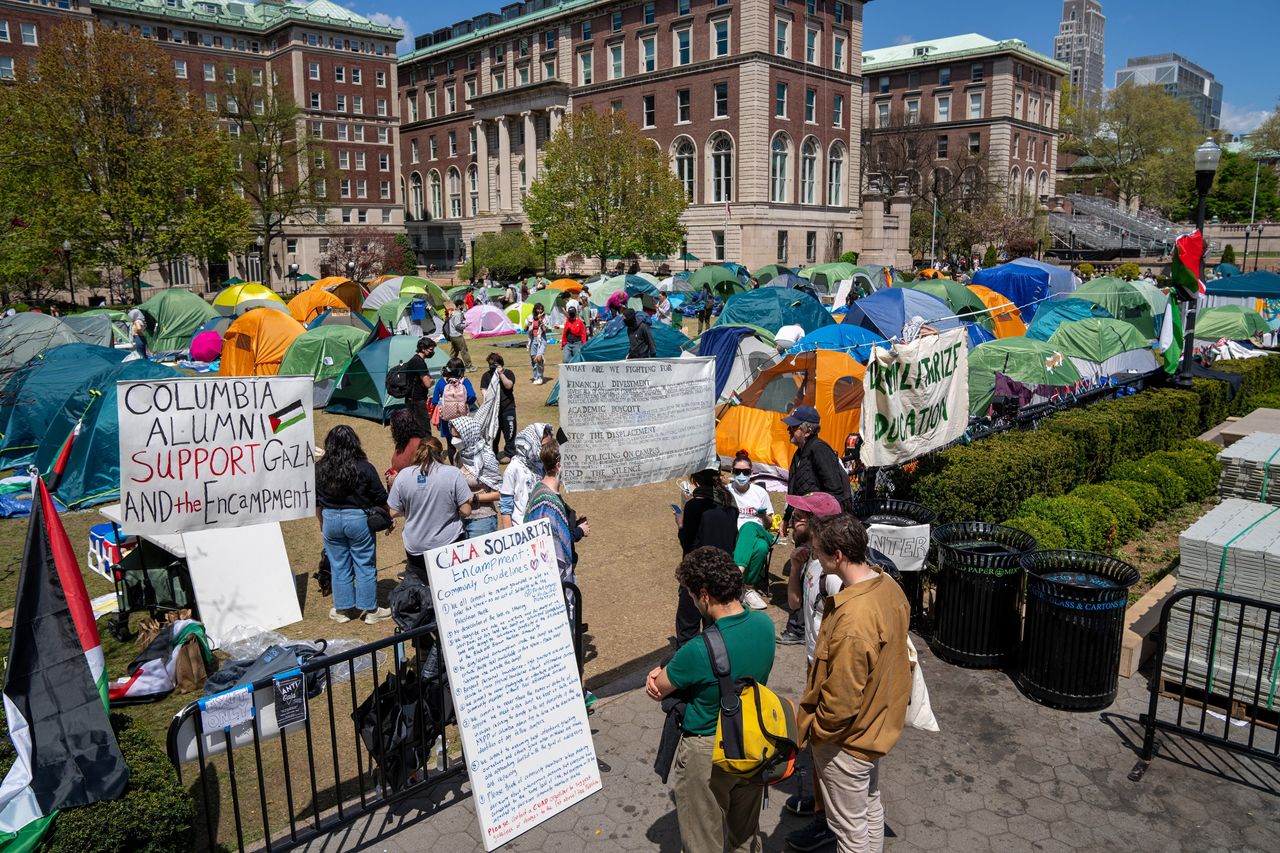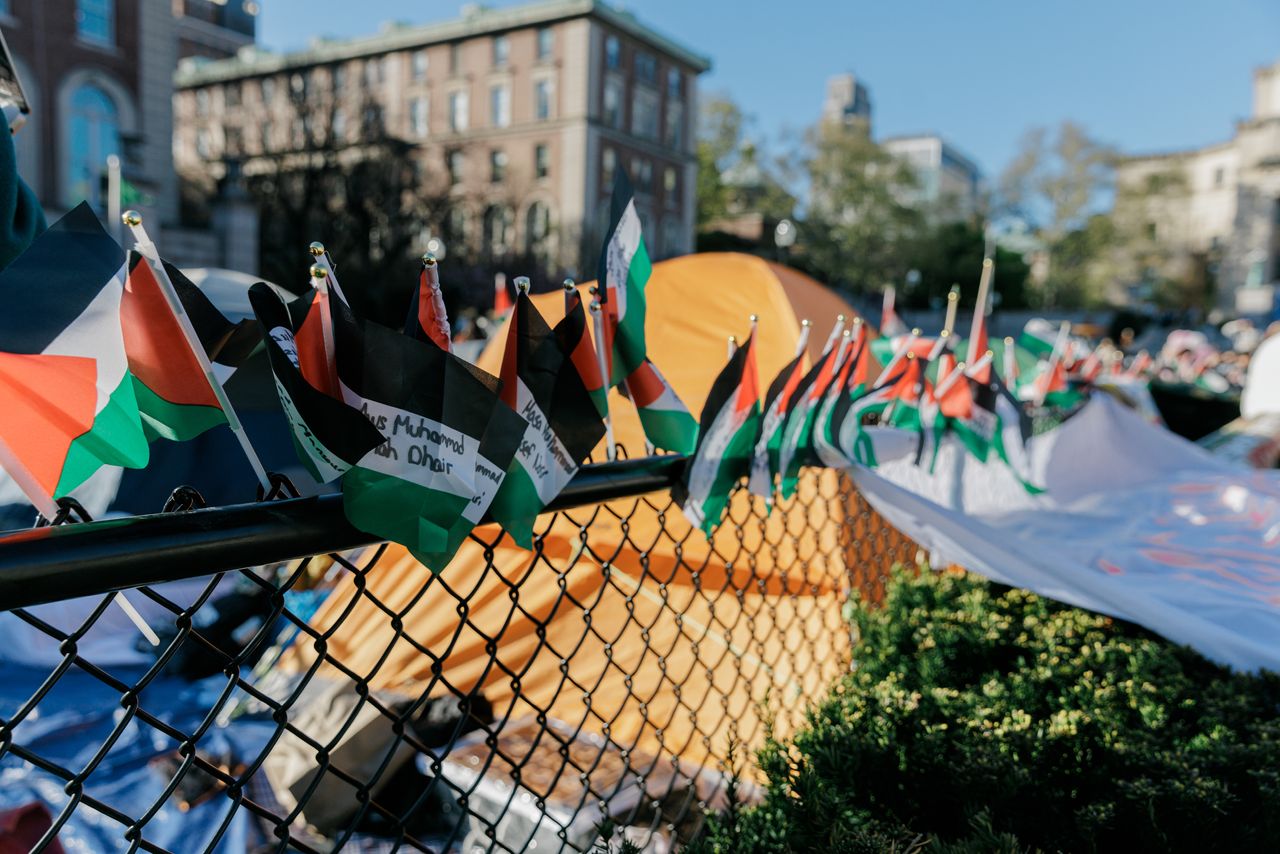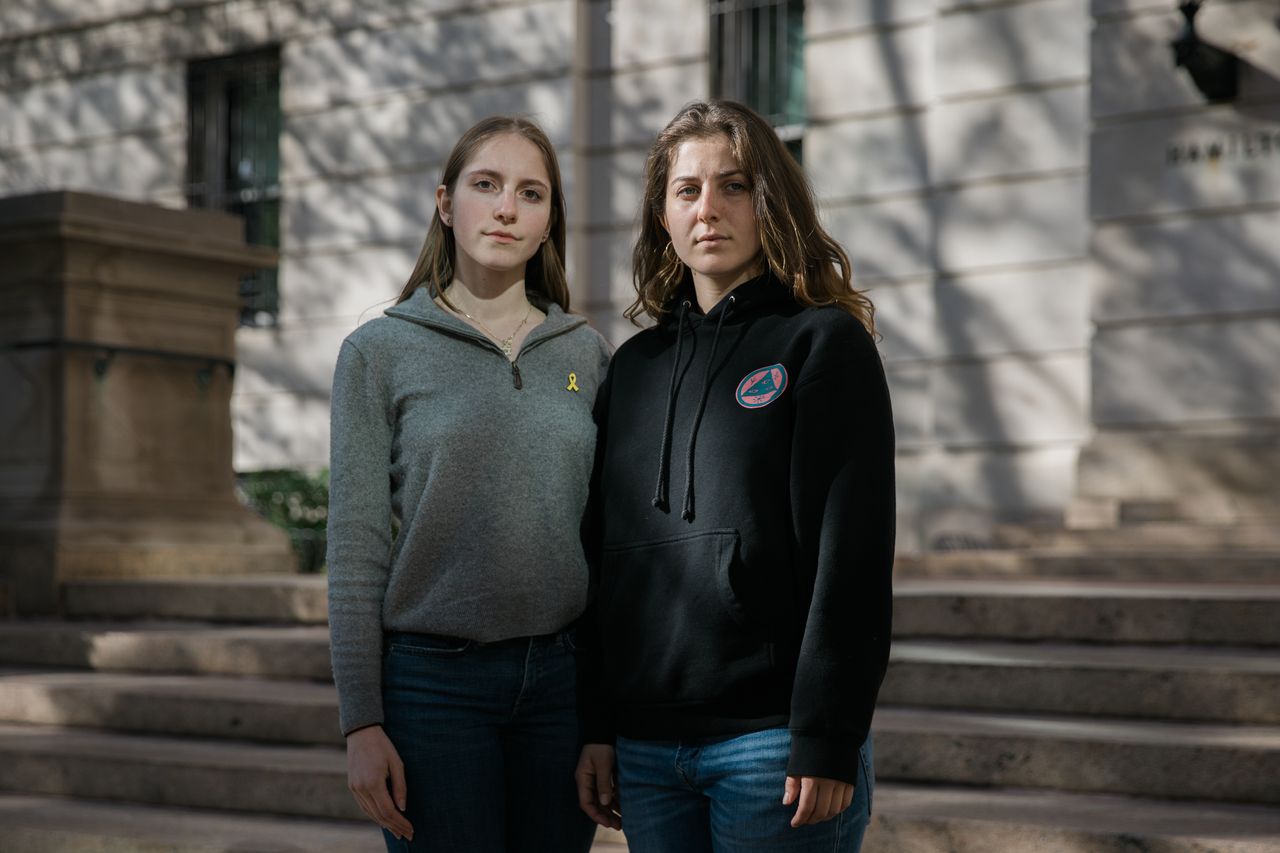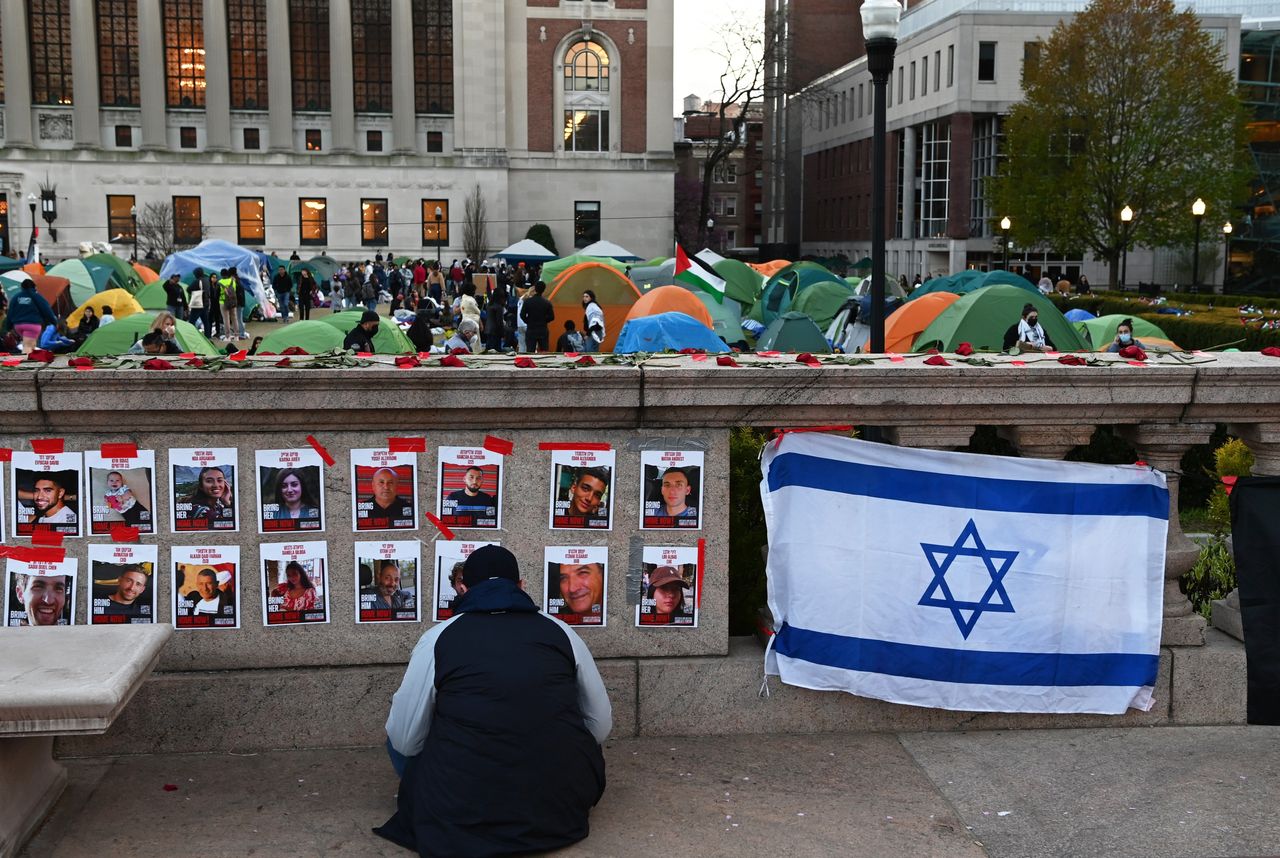NEW YORK—As protesters chanted, “Down, down with occupation,” two young Jewish men stood shoulder to shoulder at the edge of Columbia University’s pro-Palestinian tent encampment and passionately voiced clashing interpretations of the same reality.
Holding the white and blue Israeli flag, Isidore Karten, a 2022 Columbia graduate, said he was frustrated that activists he saw as siding with Hamas and furthering antisemitic hatred were taking over his alma mater’s public lawn. “Why are there people supporting terrorism here and no one’s doing anything about it?” he said, refusing to leave.
Jared Kannel, a master’s student, held a sign with the names of Palestinian children killed since Oct. 7 and said conscientious people everywhere should stand up against the murder of innocents by Israel. “I don’t want him speaking for all Jews the way that people have claimed to speak for all Jews while waving these ridiculous flags,” he replied, referring to Karten and his Israeli flag. “Acknowledge my Judaism and simply disagree with what I’m saying.”
It was a brief exchange at the “Gaza Solidarity Encampment,” which has made Columbia’s Manhattan campus the epicenter of the intensifying student protests over Israel’s invasion of Gaza after the Oct. 7 attack by Hamas, occupations that have led to unrest and arrests at universities from New York to Texas to California.

But the exchange captured the swirl of emotion, anxiety and angst as protesters, counterprotesters, faculty and the rest of the student body navigate the turbulent final weeks of the school year at college campuses riven by differing views on the Israel-Hamas war.
Police called in
The atmosphere remained charged heading into the weekend, as activists and Columbia University President Minouche Shafik continued negotiations aimed at dismantling the encampment while ensuring that students had an avenue to express their feelings.
“We have our demands; they have theirs,” the university said.
Tensions remained raw ahead of final exams, which start in the week ahead. Many students said they were still processing their shock after Shafik called in the New York City Police Department, which forcibly cleared students from their initial encampment and arrested more than 100 on April 18.
A new encampment, begun almost immediately after the old one was cleared, teemed with activists who had pitched tents on a lawn bordered by hedgerows in front of Butler Library. People in yellow vests controlled who entered the camp, pointing newcomers to a set of 10 community guidelines on a whiteboard.
No. 1: “We all commit to remain grounded in why we enter this space—as an act of solidarity with the Palestinian people.” No. 10: “Do not engage with counter protesters.”
Many in the encampment declined to share their names, and kept their faces shielded out of concern for their safety. Some said they worried about blowback on their families.
Maryam Alwan, a 22-year-old Palestinian-American who was among the Columbia students arrested April 18, said she learned of the new encampment shortly after being released from an NYPD holding cell and given a trespass summons. She is an organizer for Columbia Students for Justice in Palestine.
Alwan, a junior studying comparative literature and society, rushed back to campus and has been sleeping and eating at the camp since then. Like other students arrested at the first encampment, she has been suspended by Columbia and can’t access her dorm or use her dining plan.

She has a May 8 court hearing on the trespassing charge, and the school hasn’t set a hearing on her suspension. Meanwhile, Alwan is part of a civil-rights complaint brought by the advocacy group Palestine Legal, alleging that Columbia’s actions have discriminated against Palestinian students and their allies.
Columbia declined to comment on the complaint.
“All of us have been suppressed for so long, and we refuse to be anymore,” Alwan said, adding that the way Columbia’s encampment has inspired others has been invigorating.
A contested space
The protesters are pushing for Columbia to divest from companies with business ties to Israel. Activists including Khymani James held a press conference this past week to reiterate divestment calls, as Karten and another counterprotester held their ground just inside the camp.
“If they feel the need to walk in and protest and counterprotest then that is their prerogative,” said James, a 20-year-old junior who is on the encampment’s security team. “And we will continue to be peaceful, we will continue to stand firm together in our demands.”
James later became a flashpoint himself after a months-old video of his being questioned by university representatives circulated online. He said things including: “Zionists don’t deserve to live.” Some pointed to the comments as proof that the broader movement for Palestine is fueled by antisemitic hate.

James apologized in a statement posted on X early Friday, saying he spoke in heat after “an online mob targeted me because I am visibly queer and Black.”
Columbia said Friday that James has been banned from campus. He didn’t immediately respond to a request for comment.
Chaya Droznik and Jessica Schwalb, both juniors, pushed back against their pro-Palestinian peers, entering the encampment a couple of times this past week as a way of demonstrating they have the same right to open spaces.
The women, both Jewish, said protesters had subjected them to harassment, including a moment they recorded of a man standing near the encampment with his face covered by a kaffiyeh, telling them, “I’m gonna do just like they did all the soldiers on Oct. 7…yo, you all got smoked.”
They wanted the discord to end.
“I think Palestinians should have their own state, I think they should have equal human rights, civil rights,” said Schwalb, who is studying human rights. “That’s what I want for anyone.”
Uncertain graduation
Roland List, a 20-year-old sophomore, paused on a campus walkway to watch the goings-on at the encampment earlier in the week with next month on his mind.
The camp is situated where parents and family members usually sit during the school’s graduation ceremony. Behind him, a grounds crew laid hard flooring and fake grass over an adjacent lawn in preparation for the May 15 commencement.

“I kind of like that it’s throwing off graduation preparations—I guess that’s sort of the point,” said List, who described himself as “antiwar, antikilling, death” and generally in support of the pro-Palestinian protesters. “If it bothers Minouche, then it’s serving its purpose.”
Matthew Oey, a senior, said his 90-year-old grandmother was planning to fly in from Singapore to watch him accept his diploma. He was worried that the ceremony could be canceled outright. “Honestly, I just kind of want to graduate,” Oey said.
The blue, green and orange tents packing the lawn had air mattresses and blankets strewn around them, but in other ways the small encampment looked like any other spring student gathering. Pink blossoms floated through the air from nearby trees as students tapped on laptops or checked their cellphones. One student embroidered on a small hoop as others doled out food from tables laden with chicken with pasta and pizza.
Protesters said they felt safe and supported despite the tumult outside. Some held Seder dinners, observed Shabbat, attended yoga classes and danced and sang.
“It’s honestly a beautiful showing of solidarity,” said Kannel.
Outside Columbia’s gates—which have been closed to the public for the past several days—the NYPD used metal barriers to confine protesters unaffiliated with Columbia, who have been rallying daily on Broadway.
Hostage posters in the plaza
Steps away from the encampment, Jewish students this past week sat by a low wall in the main plaza that hid them from view.
On the wall were rows of posters featuring the hostages taken by Hamas on Oct. 7.
Ariana Pinsker-Lehrer, a graduate student, said she wished the protest movement “would learn to advocate for Palestinian rights without dehumanizing, demonizing and devaluing my community’s identity and lived experience.”
She looked at the hostage posters and wondered whether the attention was in the wrong place.
“They are the center of what is happening,” she said of the hostages. “People in Gaza who are suffering are at the center of what is happening. And not Columbia, and definitely not this encampment.”
Write to Erin Ailworth at [email protected] and Joseph Pisani at [email protected]
News Related-
Russian court extends detention of Wall Street Journal reporter Gershkovich until end of January
-
Russian court extends detention of Wall Street Journal reporter Evan Gershkovich, arrested on espionage charges
-
Israel's economy recovered from previous wars with Hamas, but this one might go longer, hit harder
-
Stock market today: Asian shares mixed ahead of US consumer confidence and price data
-
EXCLUSIVE: ‘Sister Wives' star Christine Brown says her kids' happy marriages inspired her leave Kody Brown
-
NBA fans roast Clippers for losing to Nuggets without Jokic, Murray, Gordon
-
Panthers-Senators brawl ends in 10-minute penalty for all players on ice
-
CNBC Daily Open: Is record Black Friday sales spike a false dawn?
-
Freed Israeli hostage describes deteriorating conditions while being held by Hamas
-
High stakes and glitz mark the vote in Paris for the 2030 World Expo host
-
Biden’s unworkable nursing rule will harm seniors
-
Jalen Hurts: We did what we needed to do when it mattered the most
-
LeBron James takes NBA all-time minutes lead in career-worst loss
-
Vikings' Kevin O'Connell to evaluate Josh Dobbs, path forward at QB
